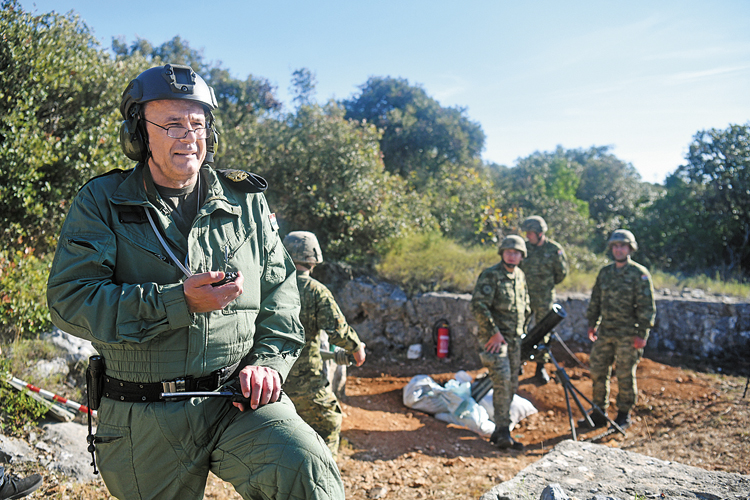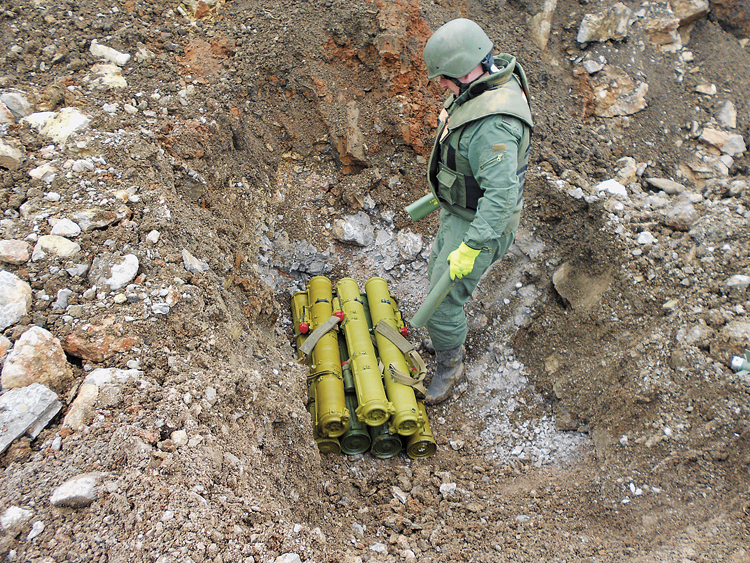The central marking of the Croatian Army and the Croatian Armed Forces Day and…
Mission – provide the Croatian Armed Forces with serviceable ammunition
 The Class-V Monitoring Department of the Logistic Operations Centre of the Support Command, headed by Major Mile Tomić, is a unit tasked with the maintenance of the ammunition by the Croatian Armed Forces for training, exercises and live-fire activities.
The Class-V Monitoring Department of the Logistic Operations Centre of the Support Command, headed by Major Mile Tomić, is a unit tasked with the maintenance of the ammunition by the Croatian Armed Forces for training, exercises and live-fire activities.
Military exercises are usually evaluated the number of participants and the quantity and the power of the projectiles fired, while less attention is given to the process that precedes them, regardless of the type of the ammunition used (infantry, artillery, mortar, missile or mines and explosives).
The maintenance of the ammunition for various activities of the Croatian Armed Forces (training, exercises and life-fire activities) is a mission of the Department for Monitoring and Maintenance of the Class V Supplies of the Logistic Operations Centre of the Support Command of the Croatian Armed Forces, whose staff survey the life-cycle of each piece of ammunition.
”The Department is composed of four sections – the Missile Ammunition Section, the Classic Ammunition Section, the Internal and External Ballistic Testing Section and the and the Laboratory for Chemical Stability of Powder, Fuels and Lubricants Laboratory. The mission of the Department is to test the explosives and extend their life cycle”, says the Head of the Department Major Mile Tomić.
Each ammunition type has a life-cycle and a warranty, and towards the end of them they undergo testing to assess deterioration grade or their period of use is extended.
The testing is a phased procedure, comprising specialist technical inspection in the ammunition depot, whose explosive specialists alongside the Department staff inspect the classical ammunition and missile technicians test the electronics of the missile munitions.
The ammunition is inspected to check for corrosion or other defects, followed by propellant sampling for laboratory testing and sampling of explosive components. On the completion of testing the results are analysed by the Department staff, which then decides whether to conduct a live-fire testing in the training range.
”Live firing is the essential phase of all testing – the last check of the condition of any class of ammunition and explosives, ranging from the small arms bullets to missiles.
“The small arms ammunition is mostly tested in the ”Vrapčanski potok“ shooting range, while large calibres, mortar projectiles and anti-tank missiles are tested in the training ranges “Eugen Kvaternik“ near Slunj and ”Zečevo“, while ammunition and air defence missiles are tested in the ”Rt Kamenjak” training range respectively. The testing of the ballistic properties of the ammunition in the ground training ranges are tested throughout the year, while the testing in the maritime ranges is conducted mostly in late October or in late November”, says Major Tomić.
”It is a demanding job to secure the ranges, as it implies closing and securing the aquatory up to the territorial waters, and the tests engage nearly all components of the Croatian Armed Forces , of the maritime police and port authorities. The “Zečevo” range is therefore only used for testing of ballistic features at maximal range”, says Major Tomić.
Ammunition life-cycle
The life-cycle of the small arms ammunition is 30 years and artillery and mortar ammunition is 15 years respectively, says Major Tomić.
“However, the service life is often extended given the durability of the essential parts and defective parts are replaced. For instance, pyrotechnic mixtures in lighters may degrade and lighters may be replaced. The decision on the extension of the life-cycle of some classes of ammunition is a responsibility of the Commission composed of the staff of the Ministry of Defence and of the General Staff of the Croatian Armed Forces and of the Department itself.
“When possible, all countries will extend the service life of the ammunition given the high cost and also the high cost of destruction. No ammunition is issued and distributed without inspection by explosive specialist or missile technicians and the respective monitoring certificate of. Each professional military has to be trained and ready, and our duty is to provide them with serviceable ammunition. In case the ammunition has been found defective, all units of the Croatian Armed Forces will be warned that it has been forbidden for use.
 The monitoring of the ammunition was introduced back in 2000 and was already harmonised with NATO standards. The following years saw the procurement of expensive equipment, including the devices for external and internal ballistic testing.
The monitoring of the ammunition was introduced back in 2000 and was already harmonised with NATO standards. The following years saw the procurement of expensive equipment, including the devices for external and internal ballistic testing.
“We planned to conduct inspection of the entire ammunition in use by the Croatian Armed Forces by 2015, and we have so far inspected 95% of the classic and rocket weapons. Since the introduction of the testing and control system as presented we have registered no accidents with the ammunition” said Major Tomić.
The ammunition stock of the Croatian Armed Forces is stored in four military depots, and the Department has set a goal to store the overall ammunition supplies in quantity in grounded facilities with the appropriate protection.
Ammunition storage
“The facilities of the kind offer excellent conditions for long-term storage and preservation of the stock. Grounded and underground facilities are the most fitted for storage of the ammunition reserves for long-term use because in the event of an explosion the blast is not transferred to the adjacent facilities. Our plans envisage the abandoning of the old facilities and construction of new ones by 2022, 2023, and the possible upgrade of the existing grounded facilities to the same safety level as the new ones” says Major Tomić.
In addition to examining the condition of the ammunition supplies, the Department is also tasked with testing of new procurements of the ammunition and explosives.
“Regardless of the certificate we receive at reception, which allows absence of testing for the first five years, the Department conducts testing to compare the results with the manufacturers. The Department also provides support to the Croatian contingents deployed to missions and operations, inspecting and testing each piece of ammunition used by their members”, says the Department Head.
Another important task of the Department is disposal of excess and decommissioned ammunition reserves.
”Some of our reserve ammunition is not NATO-compatible and Croatia now being a NATO nation is obliged to dispose it. Artillery ammunition is disposed of through delaboration (decomposed into the parts, which can be sold as secondary raw materials. The Supply Battalion of the Support Command earns over million HRK from the sale of aluminium, brass and iron annually. The expensive and uneconomical reserves are sold to civilian disposal firms. The Department is in charge of the external and internal ballistic measurement, of ballistic precision measurements and uses high-speed thermal cameras to detect failed powder burning in missiles.
”It definitely is a challenging and dynamic specialty. We do a rare job in the world, which most often is a job of military technical institutes and ammunition manufacturers, so I am proud that we have managed to develop our system to a high level”, concluded Major Tomić.
Croatian version:
